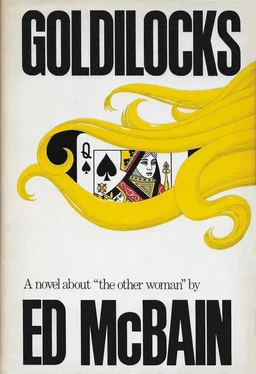“What I’m saying—”
“What you’re saying is that a telephone call would have substantiated my alibi, isn’t that what you’re saying?”
“You used the word, Betty, not me.”
“I don’t need an alibi, I didn’t kill that bitch.”
“I’m sure you told that to the police.”
“Yes, I told them. But I saw them ringing doorbells after they left here. One of my neighbors phoned later to say they’d asked her whether she’d seen any lights on in the house last night, whether the car was in the garage—”
“ Were there any lights on?”
“Only in the television den, on the beach side. No one on the street side could have seen them. And the garage door was closed, none of my neighbors would have had any way of knowing whether I was home or not.”
“But you were home. You just told me...”
“Yes, I was home.”
“Then what are you worried about, Betty?”
“I don’t want to get involved in this. I’ve got a reputation to protect in this town, it isn’t easy for a woman alone. My life is difficult enough as it is, Jamie robbed me of my dignity, and my pride, and now he’s... with his, with his big mouth he’s suggesting—”
“He’s suggesting no such thing. I was with him during the police interrogation. Not once did he cast the slightest... look, Betty, what the hell do you want?”
“I’ll tell you what I don’t want. I don’t want anyone coming around here again asking me questions about where I was, treating me like a common criminal, just because Jamie—”
“Jamie said nothing to—”
“You give him a message for me, okay? You tell him that if I hear he’s so much as breathed a word to anyone — and I mean anyone — about a possible connection between me and those murders, I’ll sue him for slander before he can bat an eyelash. You go tell him that.”
“Is that why you asked me to come here?”
“Yes. You’re his attorney. He should be warned. I don’t want anyone snooping into my private life. He embarrassed me enough when he... when he flaunted his goddamn affair to the whole town, started living with Goldilocks even before we’d reached a settlement, eighteen months , the son of a bitch, living with her in that little love nest on Stone Crab. You tell him what I said, Matt. You warn him—”
“I’ll warn him, but I hardly think a warning is necessary.”
“Tell him what I said.”
“I will.”
“And tell him something else.”
Her back was to the ocean, the sun hung almost at its zenith, illuminating the sand and the water with a harsh flat glare. Her eyes met mine.
“Tell him I’m glad they’re dead.”
“I don’t think you want me to tell him that, Betty.”
“Tell him,” she said. “Tell the rotten bastard.”
I wasn’t surprised that Ehrenberg had been to see her. I knew very little about the man as yet, but I suspected he would take nothing for granted in this case — not Jamie’s alibi, nor the whereabouts of his former wife on the night of the murders. I felt certain that it would only be a matter of time before he learned all about Jamie’s hurried departure from the poker game and his subsequent assignation with Catherine Brenet. I felt certain, too, that he would not accept Betty’s alibi on her word alone. If no one had seen lights in the house, if no one could say positively that Betty had indeed been home last night, then she could have been anywhere. And anywhere might have been Jacaranda Drive, where Maureen and the children were being killed.
I thought about this all the way back to the office. The murders had been committed in apparent rage, and if there was one thing Betty Purchase had in abundance, it was anger. I wondered if I should call Ehrenberg to repeat what she’d said just before I’d left the house — “ Tell him I’m glad they’re dead .” I didn’t have to call him. When I got to the office, Cynthia told me he himself had phoned not five minutes earlier to report that Jamie’s son Michael had confessed to the murders.
In Calusa, the police station is officially called the Public Safety Building, and these words are lettered in white on the low wall outside. Less conspicuously lettered to the right on the brown metal entrance doors, and partially obscured by Pittosporum bushes, are the words Police Department. The building is constructed of varying shades of tan brick and its architecturally severe face is broken only by narrow windows resembling rifle slits in an armory wall. This is not unusual for Calusa, where the summer months are torrid and large windows produce only heat and glare. I entered the building, and walked directly to what was obviously a reception desk. One of the girls there told me I could find Detective Ehrenberg and Dr. Purchase on the third floor, and then buzzed Ehrenberg to let him know I was on the way. He and Jamie were waiting for me when I stepped off the elevator into the corridor. Ehrenberg looked sympathetic and grave, and he said at once, “I’ve already told Dr. Purchase how sorry I am about this.”
“I’d like to talk to Michael,” I said. “ Alone , Jamie.”
“That’s usually best,” Ehrenberg said, and nodded reassuringly. I did not for a moment doubt that the arrest of twenty-year-old Michael Purchase had upset him. He seemed to be a man who could not easily hide his feelings or pretend to feelings that weren’t genuine. He was disturbed by the turn of the events, and it showed on his face and in the slump of his shoulders. His hands were in his pockets. He seemed almost ashamed of the fact that we were here on a bright sunny afternoon to examine the bloody deeds of a midnight just passed.
“All right,” Jamie said, “but, please, I want to see him before—”
“You can talk to him before we question him,” Ehrenberg said. “But then it’ll have to be just his attorney present, if he wants one.”
“I may have to call in a criminal lawyer,” I said.
“If that’s what the boy wants, fine.”
“Have you talked to him yet?”
“Why, no, sir,” Ehrenberg said. He looked suddenly injured.
“You said he’d confessed to the murders...”
“Yes, but that was to the arresting officer. That was still a field investigation, the officer wasn’t required to read him Miranda-Escobedo . We advised him of his rights the minute he was in custody here at this facility. He said he wanted us to call his father, and we finally reached Dr. Purchase at your office.”
“All right,” I said, “let me talk to him, please.”
He had walked us into a large reception area dominated by an orange letter-elevator that rose like an oversize periscope from the floor diagonally opposite the entrance doors. There was a desk against the paneled wall facing us, and a girl sat behind it, typing furiously. The clock on the wall above her head read twelve-fifteen.
“He’s in the captain’s office,” Ehrenberg said. “If you’ll have a seat on the bench here, Dr. Purchase, I’ll find somebody to bring you a cup of coffee.” He indicated the bench, and then led me past an American flag in a floor stand, to where another pair of doors stood at right angles to each other in a small alcove. He opened the door on our left, and I went into the room. The door clicked shut behind me.
At first I thought the office was empty. There was a desk on the wall opposite, a green leatherette swivel chair behind it. On the paneled wall above the desk, several framed diplomas. Bookshelves behind the desk, a hookah pipe on the top shelf. Framed photos of women I guessed were the captain’s wife and daughters. From the corner of my eye, I saw Michael Purchase sitting in a chair to the right of the door, and walked to him at once.
Читать дальше












